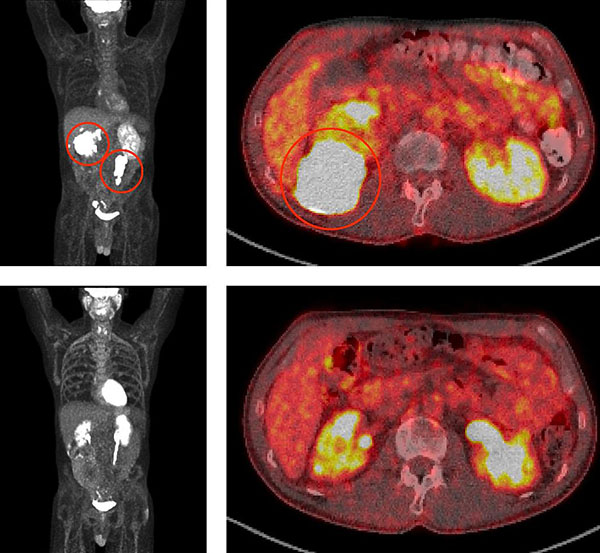Combination targeted treatment produces lasting remissions in people with resistant aggressive B-cell lymphoma
Combination therapy developed by NIH researchers demonstrates the power of precision medicine
Researchers at the National Institutes of Health (NIH) have developed a non-chemotherapy treatment regimen that is achieving full remissions for some people with aggressive B-cell lymphoma that has come back or is no longer responding to standard treatments. The five-drug combination targets multiple molecular pathways that diffuse large B-cell lymphoma (DLBCL) tumors use to survive.
In a clinical trial at NIH’s National Cancer Institute, researchers tested the combination of venetoclax, ibrutinib, prednisone, obinutuzumab, and lenalidomide (called ViPOR) in 50 patients with DLBCL, the most common type of lymphoma. The treatment shrank tumors substantially in 26 of 48 (54%) evaluable patients, with 18 (38%) of those patients’ tumors disappearing entirely, known as a complete response. At two years, 36% of all patients were alive and 34% were free of disease. These benefits were seen mainly in people with two specific subtypes of DLBCL.
The findings were published June 20, 2024, in the New England Journal of Medicine.
“Many of these patients who stopped responding to standard treatments would have otherwise died within a year, and now we have a good proportion who are still alive past two years, and some past four years,” said Christopher J. Melani, M.D., of NCI’s Center for Cancer Research, who co-led the study. “It’s gratifying to see these long-term remissions and potential cures in patients.”

Before treatment with ViPOR, full-body and cross-sectional PET scans of a patient show large lymphoma tumors (circled in the top two panels). Following treatment, the tumors have disappeared (bottom two panels).
This page was last updated on Thursday, June 20, 2024